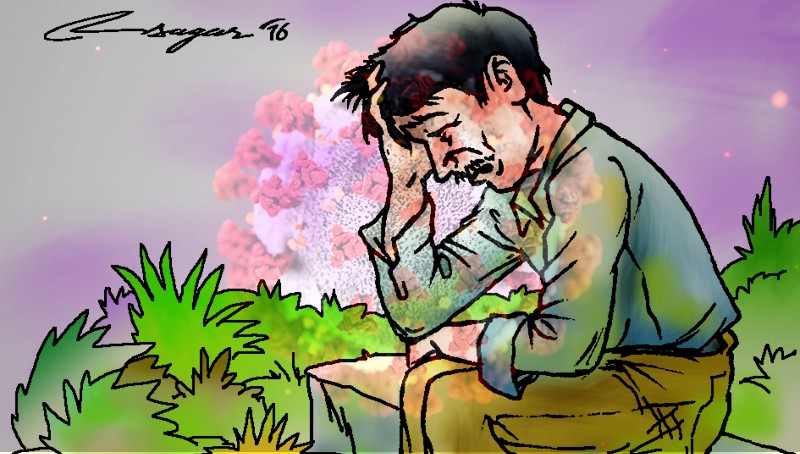COVID’s challenges: Ways to cope with them
The pathway the disease has created is a turbulent one, and it is up to all Nepalis to decide how to go through it successfully. Though it has wreaked havoc, the pandemic can be used to advance the country’s healthcare system. The financial crisis should help advance tech companies since crises have helped develop and advance societies
COVID-19 has ravaged the globe and has held the world hostage, literally. The disease came by surprise, and managing it is going to be a challenge.
The government did take some measures to control the spread of the virus by imposing a total lockdown and closing the borders.
The pandemic has resulted in the closure of businesses worldwide, and the country’s economic status took a major hit. Unemployment issues brought financial, social and psychological problems. Due to poor finance, many families have been suffering from poverty.
COVID-19 has led people to depression, tension, harassment, frustration, anxiety, nervousness, stress, hesitation, unnecessary thinking, humiliation, loss of physical fitness and suicide. People have lost their income with no way to support them.
Many have abandoned their homes to remain homeless, tensions between family members have arisen, and many in debt are unable to pay. Besides the economic problems, unemployment has led to an increase in the crime rate, social separation, domestic violence and ill-health. It has imposed negative psychological impacts like loss of identity and self-esteem, promoted unhealthy habits, increased family and social pressures, and greater uncertainty about future work. Moreover, the pandemic has resulted in substandard housing, inadequate nutrition, food insecurity and poor childcare services, and has left under-resourced schools in turmoil, which adversely affects children.
The lockdown, which started as a way to fight COVID-19, had long started to pose as a double-edged sword. While on the one hand, it started as a preventive strategy to contain the spread of the disease, on the other, increasing hunger due to scarcity of available food resources put the livelihood of daily wage workers, who have been left without work for months, at risk. The Khula Manch, which was once an open public space for people to raise their voice against autocratic rule, now has become a place where different non-profit organisations and supporters provide food for the needy people. Due to the pandemic, economic slowdown has resulted in the closure of industries and has rendered thousands more jobless. The textile industry, which employs thousands of Nepalis, is laying off employees. Also, other service sectors, like hotels and airlines, to name a few, have asked their workers to leave.
Many Nepalis are employed in the informal sector, where the harsh economic times have given a blow to most industries and segments, which rely heavily on their services.
The entire population is in distress due to the pandemic, especially the underprivileged people and blue-collar workers, whose work cannot be shifted online unlike many modern jobs. Therefore, many people have lost their jobs and have been rendered dependent on essential supply donations.
The response to COV- ID-19 in our country and neighbouring countries has led to different obstacles in the global and regional supply chains. Nepal is a landlocked country, which is mostly dependent upon the agricultural and tourism industries, has suffered a lot. Almost all the sectors have directly or indirectly been affected by the pandemic. Thus, the government has to boost these industries through various schemes and policies to get them back on track. The government has to boost more labour-intensive industries. Self-employment, the micro sector, cooperative sector, banking sector and medium-scale enterprises should also be backed by the government. Moreover, adequate policies should be brought in to help uplift the economy and steer growth.
According to an analysis by the Asian Development Bank, the outbreak of this deadly disease will hit almost every Nepali economic sector. All the service industries, such as the tourism, aviation and hospitality sector, have been hit badly by the outbreak.
With the promotion of the “Visit Nepal 2020” campaign in January, the country had hoped to attract millions of visitors. However, the campaign got cancelled due to the COVID-19 pandemic, which has crushed the hospitality and tourism-related business sector.
The situation is stressful and out of control. Although people are yet to experience the full impact and outcomes of the coronavirus, the global economy’s disruption has already created economic uncertainty among all of us. People are in distress and are unwary and uncertain about how long the crisis will last.
In conclusion, the COV- ID-19 pandemic has startled and awakened the government, legislators and public health professionals to identify gaps within the national and local health framework. They have to bridge the healthcare system through appropriate planning to counter similar future outbreaks. The government has made great strides to contain the virus and the challenges it has brought. However, a lot must be undertaken as there is much to improve and manifold cracks and fissures to be filled.
The pathway the disease has created is a turbulent one, and it is up to all Nepalis to decide how to go through it successfully.
Though it has wreaked havoc, the pandemic can be used to advance the country’s healthcare system. The financial crisis created should help advance tech companies since crises have helped develop and advance societies.
Shrestha is ex-deputy director of Agricultural Development Bank (ADBL)






